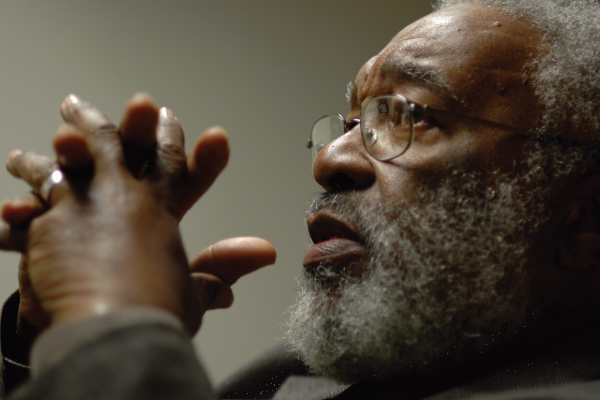I SAT MY two boys down the night I got the call and heard the news. “Uncle Vincent has died and passed on,” I told 15-year-old Luke and 11-year-old Jack.
I could see the sadness in their faces. Vincent Harding had been like an uncle to them, an elder and mentor to me, a formative retreat leader for the Sojourners community, and one of the most insightful commentators and historians of the true meaning of the civil rights movement and Martin Luther King Jr.
Dr. Harding and Dr. King were friends. Vincent and his wife, Rosemarie, were part of the inner circle of the Southern freedom movement, and Harding wrote the historic speech that King delivered at Riverside Church in New York City on April 4, 1967, where he came out against the war in Vietnam and identified the “giant triplets” of racism, extreme materialism, and militarism.
That speech was perhaps King’s most provocative and prophetic address. It reflected King’s heart and mind, and went further than he had gone before in challenging foundational and systemic wrongs in U.S. life and history and not merely calling for racial integration. This King—particularly in his thinking and writing from 1964 and the passage of the Civil Rights Act until 1968, the year of his assassination—was a King perhaps best understood by his speechwriter that day, Vincent Harding.
That’s what Vincent always did for us all: asked us to go deeper into our faith.
My boys have vivid memories, which we talked about on the night of Vincent’s death, of a bitterly cold January day in early 2009 when the country inaugurated its first African-American president. Barack Obama represented the dramatic changes occurring in U.S. life regarding who would constitute the next America—a majority of minorities. In his late 70s, Vincent had come from his home in Denver to be present for the inauguration which drew nearly 2 million people. I remember his health wasn’t so good at the time, and the weather was unbelievably cold. But I had helped get Vincent tickets to attend President Obama’s inauguration, and he was determined to accompany our family on that cold day. Vincent had a warmth in his heart and face that lifted the temperatures of all those around him.
What an amazing gift, to have your two boys watching the celebration—more than just the inauguration—of the first black president, accompanied by the whispered commentary of Vincent Harding. Vincent was a leading historian of the civil rights movement and a participant in those extraordinary events—and someone who could tell my children how Martin Luther King might have felt about this day.
To be with Vincent, as I was blessed to be so many times, was to never feel alone. It wasn’t just his personal presence, but the way he would sweep you up into that community of faith that goes back so far and still points us to the future. Vincent would help you to know them as well as him. “To know them, to know that they are present,” said Vincent Harding, “is to know that regardless of how alone we feel sometimes, we are never alone. We are never alone: nowhere, nohow, in nothing. Never.”
Years ago, Vincent and Rosemarie wrote an essay in Sojourners on the “many faces of hope.” In it, they wrote: “When we hear the ancient testimony, ‘Our hope is in God,’ we know what that means. We have seen and heard and felt that God’s hope has come into our lives through God’s children, especially those who have lived, worked, prevailed, died, and lived on in the midst of magnificent struggles to create and receive a new life, a new community, a new hope.”
They continued, “Indeed, hope urges us forward, and we go. Bearing the blessings of the past, anticipating the revolutionary, humanizing transformation of these United States and of our own needy lives, we move forward toward the dawn with all who dare to hope, with all who see God in the faces of the human family.”
Thank you, Vincent. You have passed, but your spirit will always endure with my family and with the many people you brought into the family of the faithful. You have been such a blessing to us and will remain with us in the days ahead. As Joy, my boys, and I look forward to the future, we will always be blessed to have you standing at our side, whispering the things we should remember.

Got something to say about what you're reading? We value your feedback!
